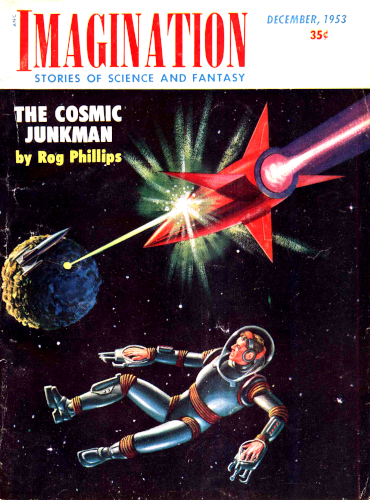
After the war, Earth stored away its robot
armies or sold them for scrap—because fighting
machines were dangerous. But more deadly was—
THE COSMIC JUNKMAN
By Rog Phillips
[Transcriber's Note: This etext was produced from
Imagination Stories of Science and Fantasy
December 1953
Extensive research did not uncover any evidence that
the U.S. copyright on this publication was renewed.]
Log Report:—
Fleet: Alpha Aquilae; 20,080 surviving ships. Flagship ROVER.
Personnel: human;
Fleet Admiral William A. Ford, Vice Admiral Paul G. Belcross robot;
2,649,366 (Ids. appended)
passenger: (human);
Generalissimo Vilbis (prisoner under w.c.a.)
Dates May 7, 4765; flight formation arrow, speed 1,700,000 m.p.s.
Scheduled date of arrival at Earth: June 11, 4766
Distance from Earth on Earth-Aquilae axis: ten light years.
"Rummy," Vilbis said, reaching through the hand-hole in the inch thicklaminated glass wall of his prison and spreading his cards on thetable. His lips formed into the cruel haughty smile that had been histrademark to billions of humans for almost half a century. His wide-setblack eyes mocked the other two players.
"Well, well," Paul Belcross smirked. "I see now why you lost the war,Vilbis. Isn't that a six of diamonds in your heart sequence?"
The black eyes glanced down. The long-fingered hand began to retrievethe cards, then paused. Vilbis' almost classic features darkened withanger. With an effort he became calm. A secret inner amusement madelittle lights in his eyes as he looked up at his two captors again.
"You know," Bill Ford said thoughtfully, "sometimes I think youmust have some kind of an ace up your sleeve. You don't seem at allconcerned that this is your last trip. The War Crimes Court—then deathby hanging." Bill frowned. "Could be you figured the angle I've alwaysworried about. The Federation is always too quick to demobilize therobots after a war. Some day some punk like you is going to take thatinto consideration. He's going to surrender, but have a reserve spacenavy waiting until Earth is without defenses, then take over and win."
"Too bad I didn't think of that when I could have done something aboutit," Vilbis said too cheerfully.
"Maybe you did think of it," Bill said. "When we get home I'm going tosuggest we keep the Aquilae Fleet mobilized for at least ten years."
"You know they won't do that," Paul Belcross said. "They're more afraidof the robots than they are of attack. So am I, actually."
"We're just afraid of what they could do if they got free," Bill said."Their potential intelligence is greater than human. If they overcametheir built-in instinct for obedience to human command they could—whythink of what our two million robots could do!"
"Why all this discussion of robots?" Vilbis said. "They're just dogs.Not even that. They were dogs for six months of their existencebefore their brains were transplanted into synthegell fluid by themind transplant machine." His eyes took on a far away look. His voicebecame regretful. "I had a hundred thousand scientists working on thatproblem. If the mind of one dog could be transplanted into synthegellwithout destroying the dog's brain there would be no limit to theproduction of robot brain cartridges. If we could have licked thatproblem I'd have won the war."
"If!" Paul spat. "You're a renegade Earthman. I'm puttin